
Liberty Home Clinic
Liberty Home’s South African clinic is an inpatient treatment centre. Patients have 24/7 support from staff who are on their own recovery journeys. The centre does not offer detox services, but we do work with nearby medical facilities that can help patients manage withdrawal symptoms.







